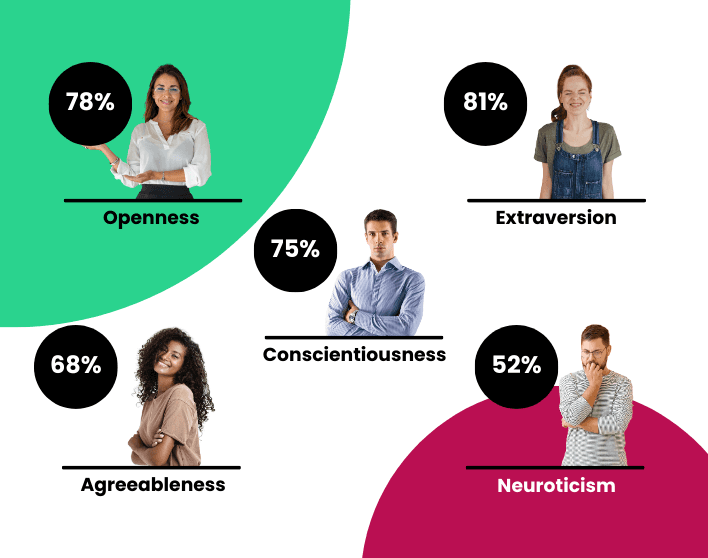Emma Becker
Psychologist & Professional Counselor
Gen Z is taking over the world—not to mention the modern workplace. Born from 1995 to 2012, this generation will soon surpass Millennials as the largest generation. In the United States alone, they already comprise over a quarter of the total population.
But did you know that Gen Z will soon invade the modern workplace? Here's the catch: By 2025, they already represent 27% of the global workforce in the Organization for Economic Cooperation and Development (OECD) countries.

However, this generation brings new perspectives with different priorities in the workplace: flexibility, diversity, and purpose. So, employers must rethink their current employment strategies and adopt innovative approaches.
This begs the question: How do you motivate Gen Z employees in the workplace? Understanding Gen Z based on their key traits is key to organizational success!
Keep reading to get some expert advice on employee motivation.
10 Expert Tips for Motivating Gen Z Employees
Employee motivation is essential for cultivating a productive and committed workforce, especially among Gen Z workers.
As the newest generation to join the workplace, Gen Z brings unique expectations, like valuing purpose, recognition, and meaningful opportunities. Keeping them motivated boosts individual performance and overall engagement, setting your company up for long-term success.
Surveys highlight key insights into what drives Gen Z at work:
According to a McKinsey report, Gen Z employees are more likely to feel their pay doesn't support a good quality of life (26% compared to 20% of others) and feel slightly less appreciated at work (56% vs. 58%). On top of that, 77% are actively job hunting—almost twice as many as other groups.
Meanwhile, Deloitte's research shows Gen Z values work-life balance, flexible hours, and strong ethics. To keep them motivated, companies should align with their priorities by promoting diversity, offering flexibility, and showing a commitment to social responsibility.
That said, here's how to motivate Gen-Z employees in the workplace:
1. Align personal with business values
Matching personal and company values is crucial for building a motivated and engaged team. HR plays a key role in hiring Gen Z employees who connect with the company's vision and mission. As they grow within the organization, ensure their values align with the company's goals to help them stay focused and motivated.
2. Provide fair compensation and benefits
In a post-COVID world, fair employee perks and benefits have become more critical than ever, especially for Gen Z workers. BBC News reported that this generation is more driven by salary than any other, with 70% citing pay as their top motivator. Many aim for six-figure salaries early in their careers, particularly in industries like the gig economy.
3. Have open communication and team collaboration
Effective communication is about being clear, transparent, and consistent, ensuring timely information exchanges between leaders and employees. It also means actively listening, showing empathy, adapting communication styles, and promoting a collaborative culture. The goal is to keep everyone aligned with company goals, boost engagement, and enhance overall performance.
Studies show that effective communication drives business success, increasing employee productivity by 25% and shareholder returns by 47%. Meanwhile, poor communication can lead to 25% of frontline workers not understanding organizational goals, with over 90% reporting errors and 38% saying projects fail due to miscommunication.
4. Offer professional development plans (PDPs)
Professional growth is vital to staying competitive in today's fast-paced job market. Gen-Z employees want clear career paths and opportunities to grow. A lack of career advancement is one of the top reasons why a quarter of American employees resigned in 2023. Likewise, 63% of employees quit jobs for the same reason besides low pay.

5. Set employee engagement initiatives
Employee engagement in the modern workplace is crucial for building strong connections between workers and their employers. However, many American workers report feeling more detached and less satisfied with their jobs than they did just a few years ago. Last year, only 33% of workers felt engaged, highlighting a worrying trend of disengagement that can harm morale and productivity.
6. Establish employee feedback and recognition
An employee recognition program acknowledges achievements and boosts morale, while employee feedback provides valuable insights to align performance with company goals. Both are key to fostering a positive work culture and supporting professional growth. Over 95% of employees claim that getting regular feedback is good in the workplace.

7. Empower with digital tools and technologies
Technology plays a crucial role in keeping businesses competitive and engaging employees in today's workplace. Many companies are already implementing digital transformation strategies, with 70% already implementing strategies or working on them.
The right digital tools can enhance motivation and streamline communication for Gen Z. Business platforms like Slack, Zoom, and Asana are essential for remote work, while AI tools like ChatGPT help streamline tasks and decision-making, keeping Gen Z employees productive and engaged.
8. Foster diversity, equity, and inclusion (DEI)
Gen Z is the most diverse generation with a mix of ethnic and racial backgrounds. Companies must embrace this by creating an inclusive work environment, offering equal opportunities, forming diverse teams, and ensuring everyone feels valued. Over 55% of employees say DEI in the workplace is good, while 30% claim it's neither good nor bad.
9. Promote work-life balance and flexible setup
The World Health Organization recognizes burnout as a serious issue caused by chronic workplace stress and emphasizes the need for work-life balance to prevent it.
As more employees seek flexibility, offering hybrid or remote work options has become essential. These arrangements promote well-being and help attract and retain Gen Z talent who value a balance between personal and professional life. About 66% say they are in the office full-time; however, only 22% want to be.
Final Words
It's clear that Gen Z now makes up over a quarter of the global workforce. However, this generation has different goals, motivations, values, and priorities unlike the previous generations. So, as an employer, assess your current strategies and implement new approaches.
To keep this generation highly motivated, consider the expert pieces of advice shared above.
Start by establishing shared values and enhancing team dynamics. Also, make sure to promote flexibility and diversity in the workplace. Finally, offer them learning opportunities, engagement activities, feedback and recognition programs, as well as digital tools and technologies.









